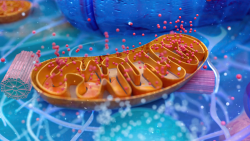Adverse reactions to fluoroquinolone antibiotics (Cipro/Ciprofloxacin, Levaquin/Levofloxacin, Avelox/Moxifloxacin and Floxin/Ofloxacin) can manifest in patients as a multi-symptom chronic illness that most resembles fibromyalgia, chronic fatigue syndrome / myalgic encephalopathy (ME) and/or an autoimmune diseases. As is the case with those chronic multi-symptom illnesses, the symptoms of fluoroquinolone toxicity vary greatly from one individual to another. Though almost everyone who suffers from fluoroquinolone toxicity has some sort of musculoskeletal issues (fluoroquinolones have a black box warning about the risk of tendon rupture), neuropathy and autonomic nervous system dysfunction, those broad categories of symptoms are where the similarities between individuals affected end. Some people suffering from fluoroquinolone toxicity have severe insomnia, others don’t. Some develop dietary intolerances, others don’t. Some become anemic, others don’t. Some develop Raynaud’s, others don’t. Some have urticaria, others don’t. I could go on and on.
Why are there such vast differences between how fluoroquinolone toxicity manifests itself from one person to another?
Look Beyond the Disease Model of Medicine
The traditional approach to medicine, using our existing paradigms, would answer that question by saying that fluoroquinolone toxicity is only responsible for the musculoskeletal issues, neuropathy and autonomic nervous system dysfunction that are the common links between those who are suffering from it; and that insomnia, dietary intolerances, Raynaud’s, anemia, etc. are from something else.
I don’t buy that answer though. The people suffering from fluoroquinolone toxicity were healthy before they crossed their tolerance threshold for fluoroquinolones, and it was only after they were exposed to fluoroquinolones that any of their symptoms emerged. The reports of thousands of people suffering from fluoroquinolone toxicity lead me to believe that fluoroquinolones cause a multi-symptom illness that can manifest itself in a variety of different ways.
Oxidatative Stress and the Mitochondrial Damage: Explaining Chronic Multi-Symptom Illness
Another possible answer to the question of why symptoms differ so much from one person to another, one that I think is closer to the truth, is that fluoroquinolones cause mitochondrial damage and that mitochondrial disorders can manifest themselves in a variety of different ways. It is noted by Doctors Bruce H. Cohen, MD and Deborah R. Gold, MD, in Mitochondrial Cytopathy in Adults: What we Know So Far, that:
“A problem that has vexed the study of mitochondrial diseases ever since the first reported case (in 1962) is that their manifestations are remarkably diverse. Although the underlying characteristic of all of them is lack of adequate energy to meet cellular needs, they vary considerably from disease to disease and from case to case in their effects on different organ systems, age at onset, and rate of progression, even within families whose members have identical genetic mutations. No symptom is pathognomonic, and no single organ system is universally affected. Although a few syndromes are well-described, any combination of organ dysfunctions may occur.”
Doctors Cohen and Gold go on to say that:
“symptoms (of mitochondrial damage) such as fatigue, muscle pain, shortness of breath, and abdominal pain can easily be mistaken for collagen vascular disease, chronic fatigue syndrome, fibromyalgia, or psychosomatic illness.”
Multiple studies have shown that fluoroquinolones deplete mitochondrial DNA and lead to an increase in oxidative stress and depletion of antioxidants within cells (source 1 and source 2). Oxidative stress and mitochondrial dysfunction (OSMD) are almost certainly why fluoroquinolone toxicity manifests itself in the form of chronic multi-symptom illness (CMI).
Even though it has been shown that oxidative stress and mitochondrial dysfunction can cause chronic multi-symptom illness, the question still remains, WHY are there such vast differences between how mitochondrial damage manifests itself from one individual to another?
A possible answer to this question lies in the fact that reactive oxygen species (ROS) generated by damaged mitochondria are signaling mechanisms that control gene expression / epigenetics.
Please excuse the momentary pause while I point out how mind blowing and important that sentence is. MITOCHONDRIAL PRODUCED REACTIVE OXYGEN SPECIES CONTROL GENE EXPRESSION. It is a huge discovery that is just now being accepted and verified by scientists. It is noted in the article Oxidative Stress and Oxidative Damage in Carcinogenesis that, “Through regulation of gene transcription factors, and disruption of signal transduction pathways, ROS are intimately involved in the maintenance of concerted networks of gene expression.” Also, per Dr. Marcin Kaminski, “The notion that mitochondria can play a role in a cell as a generator of strictly regulated oxidative signals is more recent, and some 10 years ago was regarded almost as heresy. Now the opinion has changed since a number of new observations have been made.”
Dr. Kaminski also pointed out in a personal conversation that topoisomerase enzymes, which are blocked by fluoroquinolones are also crucial for regulating gene expression. According to the FDA warning label for Cipro/ciprofloxacin:
Perhaps the differences in how individuals react to fluoroquinolones are due to the differences in which genes are triggered as a result of both mitochondrial damage (and resultant oxidative stress) and the influence of topoisomerase interrupters on gene expression.
Individual Susceptibilities Influence Mitochondrial Damage
To use myself as an example, my 23andme genetic test results showed that I had a genetic predisposition toward rheumatoid arthritis (RA), an autoimmune disease. When I first was struck with fluoroquinolone toxicity, I was not aware that Cipro was the culprit behind the sudden deterioration in my health, and I thought that I had an autoimmune disease – with RA being the one that I suspected because my joints were swollen, inflamed and painful. It turns out that I didn’t have RA, rather, I was suffering from fluoroquinolone toxicity. But the symptoms manifested themselves in a way that made it look and feel very much like I had RA Another example is of a gentleman who commented on a blog about fluoroquinolone toxicity, www.floxiehope.com, who noted that his hereditary haemochromatosis (excess iron in the body) was brought on (or at least worsened) by his adverse reaction to a fluoroquinolone. I, on the other hand, was helped greatly by supplementing iron and suspect that I was anemic after having an adverse reaction to Cipro.
Even though there are genetic differences from person to person, and the expression of those differences may explain why the symptoms of fluoroquinolone toxicity syndrome differ from one individual to another, the entire chronic disease state – with all of the symptomatic differences between individuals, is brought on by fluoroquinolones and thus, despite the individual differences, the symptoms cumulatively should be considered to be part of fluoroquinolone toxicity syndrome. Even though I had a genetic predisposition for R.A., it likely would have remained dormant (I don’t know of anyone in my family who has ever had R.A.) had it not been triggered, (along with musculoskeletal issues, neuropathy and autonomic nervous system dysfunction) if I had not taken Cipro and had not suffered through damage to my mitochondria. I cannot be sure of that – it’s not possible for anyone to know at this point, but it is an interesting assertion to ponder.
My assertion, that fluoroquinolones cause changes in gene expression, and that the genes that are expressed determine what symptoms of fluoroquinolone toxicity present themselves, of course needs to be tested and verified before it is accepted as truth. I hope that more scientists look into the adverse effects of fluoroquinolones and all other mitochondrial damaging pharmaceuticals. After all, our mitochondria and the ROS that they produce affect our GENES, and our genes are pretty important.
Information about Fluoroquinolone Toxicity
Information about the author, and adverse reactions to fluoroquinolone antibiotics (Cipro/ciprofloxacin, Levaquin/levofloxacin, Avelox/moxifloxacin and Floxin/ofloxacin) can be found on Lisa Bloomquist’s site, www.floxiehope.com.
Participate in Research
Hormones MatterTM is conducting research on the side effects and adverse events associated with the fluoroquinolone antibiotics, Cipro, Levaquin, Avelox and others: The Fluoroquinolone Antibiotics Side Effects Study. The study is anonymous, takes 20-30 minutes to complete and is open to anyone who has used a fluoroquinolone antibiotic. Please complete the study and help us understand the scope of fluoroquinolone reactions.
Hormones MatterTM conducts other crowdsourced surveys on medication reactions. To take one of our other surveys, click here.
To sign up for our newsletter and receive weekly updates on the latest research news, click here.
What Else Can I Do To Help?
Hormones MatterTM is completely unfunded at this juncture and we rely entirely on crowdsourcing and volunteers to conduct the research and produce quality health education materials for the public. If you’d like help us improve healthcare with better data, get involved. Become an advocate, spread the word about our site, our research and our mission. Suggest a study. Share a study. Join our team. Write for us. Partner with us. Help us grow.
Please support Hormones Matter and our research projects. Contribute to our crowdfunding campaign – Crowdfund Us.
















I just read your post..and I too had lavaquin and cup to. Ended up with RSD and lupus. I can tell you without a doubt. YOUR DIET MATTERS! I quit eating sugar..anything made with flour..all simple carbs and I am doing 99.9% better than I ever was! I suggest if you really want to see improvements in your autoimmune disorders to do the same! My RSD is gone..three years I had injections in my feet..legs and spine to keep it at bay. I suffered so much. 20 years I have fought lupus..and the ONLY THING THAT HAS WORKED WAS CLEANING UP MY DIET! No medications really helped. SUGAR has a massive impact on the body..carbs are also converted into sugar. Look up the impacts of sugar on your illnesses and you will see what I saw. I am living proof that diet can cure and help. I beg you to try it and see for yourselves.
The link to the study was not hyperlinked. Can it be provided?
Dave
Is it possible that the FQs “switch on” all our dormant genetic conditions? Since being “floxed” (at least twice) I seem to have symptoms of Hartnup’s, Gitelman’s, Cystic Fibrosis, EDS, porphyria etc etc and I do have variants in those genes but never had such severe problems before. Can we switch them off again?
I took levaquin and cipro on and off for about 2 years for ear and sinus infections about 16-17 years ago. They did not get rid of my infections. Instead I had side effects that made me feel ill in other ways. After 2 years, Doctor decided I needed sinus surgery, but I wish he would of cleared out both sinuses because I am having problems in other side now.
After surgery, severe pain started in arms, legs, hands and feet as well as cold hands and feet. I was diagnosed with raynaud’s syndrome. After that pain in muscles and joints started getting really strong, especially muscles. Also pain in my chest. It was also very hard for me to raise my arms to brush my hair, etc. I was suddenly lath advice and very fatigued. I was diagnosed with lupus but also potential neurological problems and connective tissue disorder. I have gotten worse each year and have not responded well to medication.